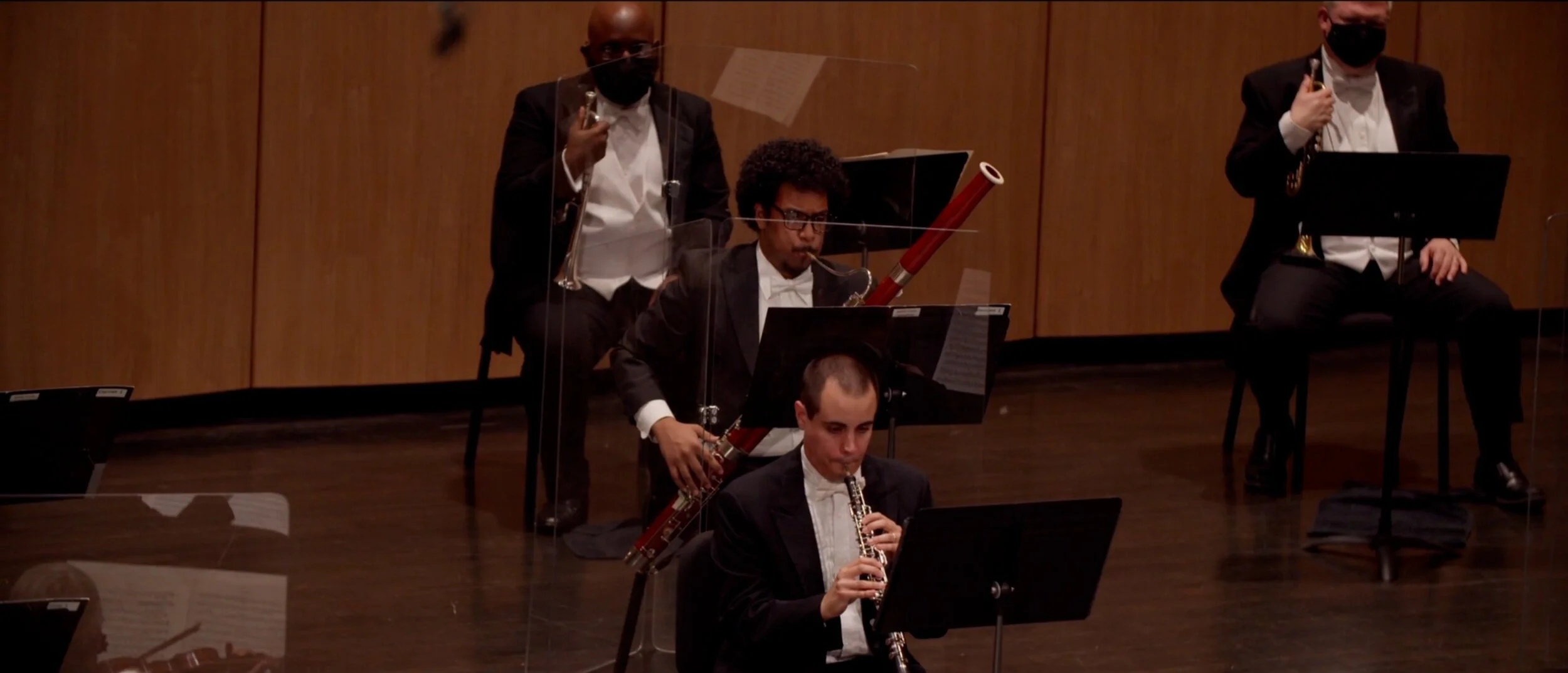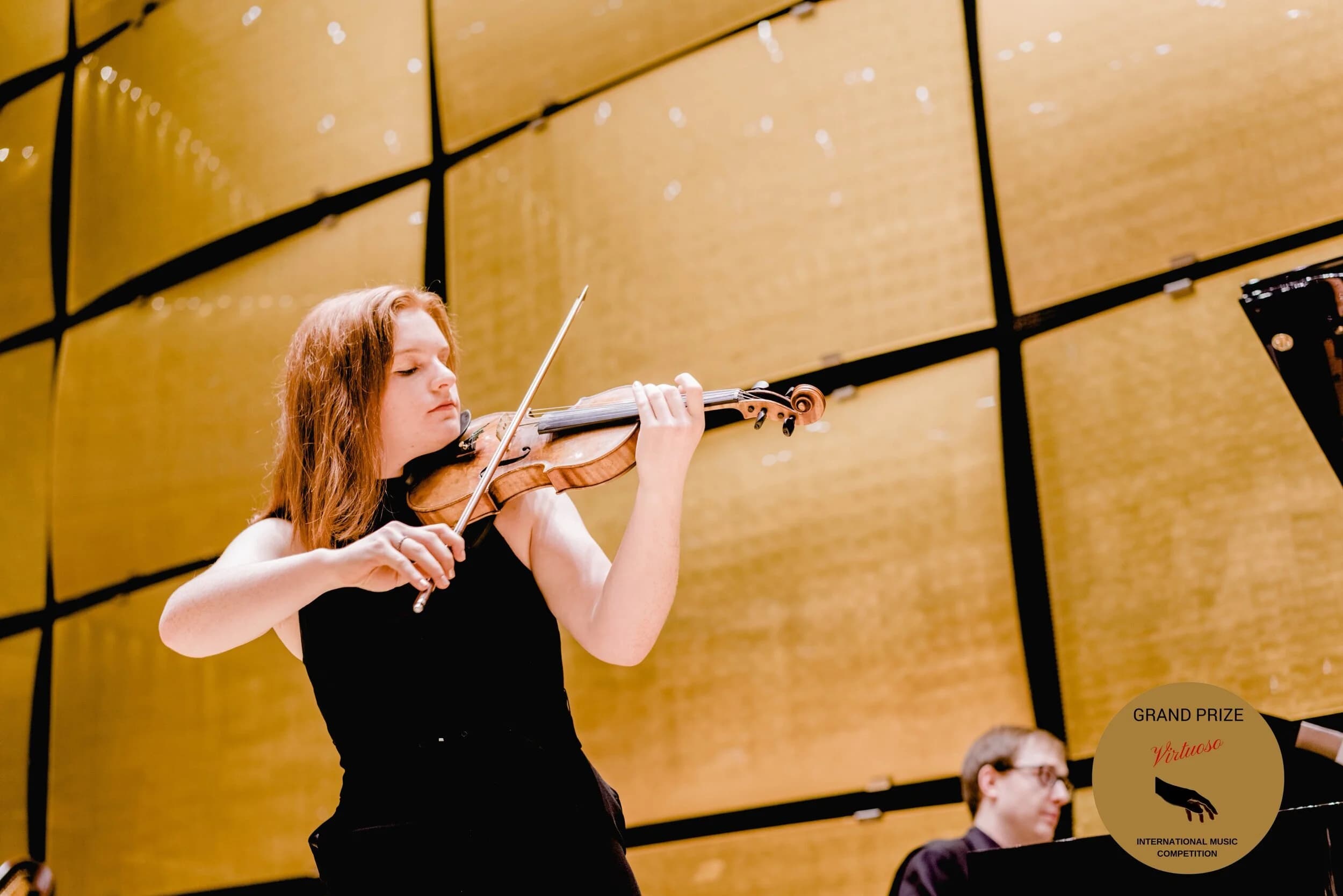Grace Wipfli: Resident Soprano of The Toledo Opera
By Garrett John Law
Welcome to Classically Minded. Today's Guest is soprano, Grace Wipfli.
Garrett: Grace Wipfli is a Resident Artist of The Toledo Opera and her contract was just extended through the 2021-2022 season. In March 2020, Grace made her Carnegie Hall Debut as soprano soloist in Ralph Vaughan Williams' "Dona Nobis Pacem". In last year's Metropolitan Opera audition cycle, she was named a regional finalist. I'm so excited to have her on the show. Welcome, Grace.
Grace: Thank you, Garrett. So glad to be here.
Garrett: So let's talk about the pandemic and how it's affected your life as a musician. Let's start from the very beginning. What were you up to in March 2020?

Grace: I think most people remember the beginning of the pandemic as mid-March. About a week before that, I was flying out to New York City to start rehearsals for my Carnegie Hall solo debut, as the soprano soloist for the Ralph Vaughan Williams' Dona Nobis Pacem.
It was an amazing experience because I was invited to be there by the conductor of my undergraduate choir from Capital University. And she had also invited a bunch of high school choirs from around Ohio to join her choir, to become this mass group. One of those high school choirs was my high school choir, conducted by my mom.
It was just this full circle, incredible experience. I couldn't have asked for anything better.
And it was the point of the pandemic where there were little bottles of hand sanitizer on the tables at the rehearsals. We were rehearsing in, like, a ballroom at a hotel. So we had 250 singers standing shoulder to shoulder, no distancing, no masks. None of that. And the actual concert was pretty much full. None of this 25% capacity. None of that. Carnegie Hall was full. It was amazing. So the peak of my career, right?

Grace: That week, I had also signed my contract for Toledo Opera for my first Resident Artist position. So, it was a banner week in my life. It was amazing.
The concert was on a Sunday and I flew back home to Chicago the next day, on Monday. By that Thursday, two of my jobs had shut down. Three days after that, my third job shut down. So in the midst of about 10 days, I had gone from amazing Carnegie Hall and signing my first year-long contract to then being completely unemployed, no income at all, driving back to Ohio, to stay at my parents' house for "two weeks" while things were shut down.
Talk about a wild turn of events! It was a little bit like whiplash. Like, whoa, this is happening really quickly. Those were the early days of the pandemic for me.
Garrett: That seems so quaint now to imagine. Just a little bit of hand sanitizer, that'll do it...
Grace: Especially being in New York City, which then turned into the epicenter of the pandemic in the United States!

Garrett: You received news that you were going to start with Toledo Opera the week before you went to New York. What was it like to work as an opera singer during a pandemic?
Grace: Toledo Opera has been a saving grace this year. It's been remarkable. From the beginning, they were committed to keeping our contracts and paying us, which was so generous of them. I recognize how lucky I am to be a professional musician this year. Which is not something that a lot of people can say. So I will always be so grateful to them for continuing to fulfill our contracts.

I signed my contract for Toledo in March 2020. And their first production was scheduled to be in early October of 2020. It was going to be Verdi's Aida, which is just a massive show and not super conducive for distancing. Toledo Opera decided over the summer to switch the fall show to then be a double bill of Trial by Jury, an operetta by Gilbert and Sullivan, and the two-person opera called Scalia/Ginsburg, which details the relationship between Justice Scalia and Justice Ginsburg.
So we knew right away that the fall show wasn't going to happen. Totally fine. That double bill then eventually got postponed to be in April 2021 and then canceled altogether.
But to create an opportunity for us, Toledo Opera started a series called Opera Outdoors, pop-up concerts and performances around the city of Toledo throughout the fall of 2020. These were performances at places like the farmer's market, the zoo, the museum, the botanical gardens, and all around the city in order to continue to bring live music to Toledoans.
It was during the fall that we found out that the rest of Toledo Opera's season had been canceled because the virus was not getting better at the expected pace.
So we ended up filming and recording everything that we were supposed to perform that year. We filmed our children's opera that we would have toured in elementary and junior high schools. We filmed a Halloween concert. We filmed a Christmas concert. We filmed arias. We filmed Valentine songs. We filmed another big concert.
It was a lot of filming, which is what a lot of arts organizations turned to this year. It was work and it was something to do, but it wasn't what any of us are trained for. I'm not trained to sing on Zoom. But, in the end, it was better to have that than to have nothing at all. So like I said, I am so continually grateful to Toledo Opera for coming up with creative solutions to keep us as busy as possible.
Garrett: You've also taken on some creative projects of your own. Maybe you could tell us a little bit about how you found new ways to stay connected with friends and family?
Grace: Sure! So, I realized pretty early on that this was going to be the time of creative solutions. And I also realized that because there were no concerts, performances, or shows, people were lacking those shared experiences.
I was inspired to create a small business called Moments of Grace. It was inspired by two different parts of my life. First by the practice of music therapy. And then also by a family friend whose mom lived out in California and really loved music, but, you know, couldn't go anywhere to see anything.
She asked if I would ever create a program for her and sing for her over FaceTime. And of course, I said, yes. And then I thought, I bet you're not the only person who would be interested in something like this. So, Moments of Grace was born.
The tagline is "Virtual Personal Concerts." The idea is, you know, I'll sing for anybody who wants to hear it and I'll help you celebrate any reason - birthdays, anniversaries, what have you. I sang for a lot of families on Zoom, some of my own family members, some other families. And it became this really wonderful and joyful thing to do in the midst of a year that wasn't abundantly joyful.
Garrett: Yes, I enjoyed seeing some of these Moments of Grace that you shared online. There was so much joy in being surprised by a birthday party or having the whole family together and watching a concert and then there's the cat walking in the background... Maybe you could tell us a little bit about a story that has to do with something political?

Grace: Oh yes! So my cousin and her partner reached out to me to see if I could sing for her parents' wedding anniversary. And of course, I said, yes. Her parents are big country fans and Dolly Parton fans in particular. So I suggested Light of a Clear Blue Morning as one of the songs for the program.
Everyone thought that was a great idea. It's a great song! Cool. All set.
The performance was scheduled to be November 8th, which then ended up being the day after Joe Biden was called to be the winner of the presidential election. By the way, my cousin, her partner, her family, and I are all very much liberals.
So this idea of Light of a Clear Blue Morning was a wild coincidence that we had chosen a song to essentially describe the beginning of a new presidential administration. I had intended to mention something about that because I knew the political leanings of the group.
Then about 20 minutes before I was supposed to start, I get this message from my cousin saying "Abort the mission, abort, abort! The radically conservative aunt has joined the family Zoom so don't talk about the election!"
I said, "Okay, got it!!" We still sang the song and it was still great, but we did not mention what had happened that week. That was just a strange timing of events.
Garrett: Yeah, that is hilarious. I have to say for myself, I was also scheduled to play a certain hymn in church that sort of fit the election season just right. So I can relate to that.
I'd like to talk about how you've adapted to this pandemic. Maybe some of the darker moments. How are you going to be different after this is all over?
Grace: It's been a tough year to be, well, really anyone. It's just been a tough year for the world.
And as a singer, it's been difficult because my career, my art form was deemed a health hazard really early on in this whole thing. So I think for a lot of people that turned into a very depressing, destructive thing to think about.

In the beginning, I realized that a traditional concert in a hall, on a stage, with an audience was just not going to be a thing for a while. So I created opportunities for myself with gigs and Moments of Grace. I just tried to keep myself busy because that's when I do the best work, when I'm working towards a project, working towards a goal.
Starting in June of 2020, I had things lined up pretty much consistently until the end of February of 2021, which was the Regional round of the Metropolitan Opera National Council Auditions that I was in this year. And once that was over, I had nothing on my schedule for months.
That really sent me into this dark place mentally. I sat around the house, not wanting to practice, not even wanting to try to come up with something to do. There was just nothing that could inspire me out of this deep, deep depression. And I realize this might have come later in the midst of everything than other people's experiences. But I think that it happened that way for me because I never realized this would ever be going on for this long. I fully expected to feel like there was a tiny bit of hope after a full year.
Garrett: I agree that everybody has their own path, their own experience of the pandemic. When this is all over, how are you going to be different from this?
Grace: That's a great question. When I think back to before the pandemic, at least in my experience, to prove you are a successful musician or singer or artist, your schedule had to be packed minute by minute.
That was proof that you were working, that you were doing things and that was the sign of success for a musician. So you had no time to breathe, to grow, to be inspired, to, you know, ask questions. Nothing. No, no, no. You just, you just went.

One thing the pandemic has gifted us is time. All of this free time. In the midst of all of these cancellations, you have that time to sit down, get your mental health in order, get your emotional health. For me, I had time to get my vocal health in order.
That has allowed me to make all kinds of growth and progress as a singer this year that I know, for sure, would not have happened otherwise.
So when life goes back to normal or whatever normal means, post pandemic, I hope that people are able to find that balance between having gigs and doing concerts and shows and all of that, but also giving yourself time to progress at the same rate that you progressed this year.
I will be very conscious of over-scheduling myself, saying "no" to an opportunity if it's maybe not the right fit at that time, because this year has just showed me how supremely important all of those areas of health are in order to do the kind of work that I want to do.
Garrett: I couldn't agree more. I think mental health has really come to the forefront. But there's still a lot of work to be done, especially for musicians. So I'm really happy for you that you've come to that realization.
So I know you actually hate this question, but I'm curious to know with all this personal time that you've had, where you see yourself in five years. Also, what motivates you as a musician?
Grace: I will answer this question because I respect you so much! So I'll start with the second part about motivation. For as long as I can remember, my answer to the questions, "What do you want to be? What do you want to do with your life?" has always been:
I want to sing and tell stories.

Because that's what it boils down to for me, connecting with other human beings. That's why I do this. I also have paired that with the idea that it doesn't matter if I'm singing on the biggest stage in the world or the smallest stage, who I'm singing for, where I'm singing, or how much I'm getting paid. I mean, money's nice and great, but you know, in the end, it doesn't matter to me all that much.
All that to say, in five years, if you're looking for an answer to that question, I would love to be a young artist for one of the top young artist programs in the country. That probably includes San Francisco, Houston Grand Opera, Washington National, and if we're really reaching Chicago Lyric and maybe the Lindemann Program at the Met. Any of those, you know, are reputable in their own right. And I would be so thrilled and amazed and grateful to experience any of those programs.
Garrett: Well, I think no matter what happens, you've got a very bright future ahead of you. That is for sure. Thank you so much for joining us on Classically Minded. I hope we hear from you soon.
Grace: Thank you, Garrett. I really appreciate it.
Garrett: Thanks for joining us on today's episode of Classically Minded. If you enjoyed today's episode and would like to learn more, please visit classicallyminded.org and follow us on social media. We hope to see you next time.



